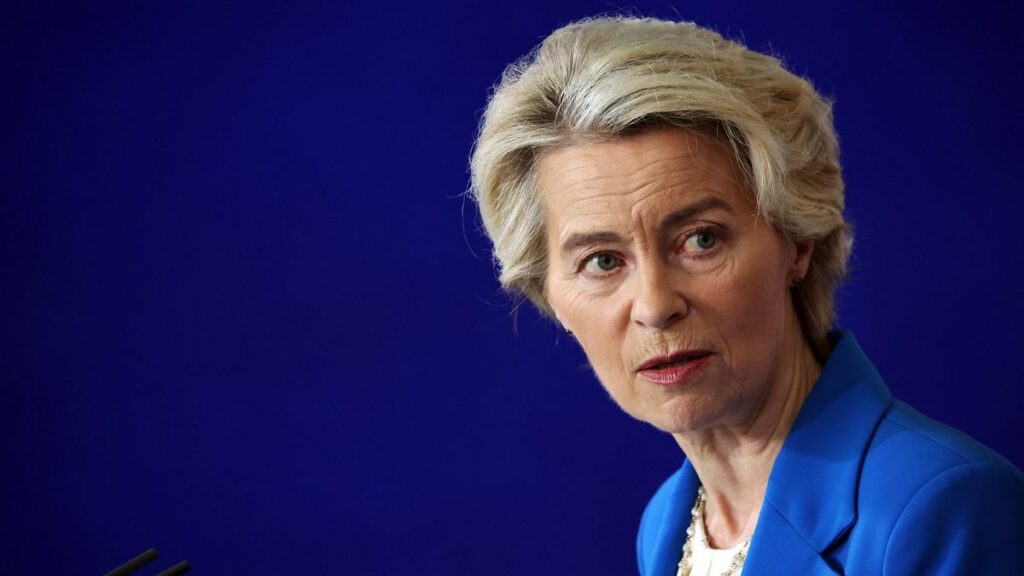The European Commission has signalled a willingness to offshore migration procedures, echoing growing calls from member states.
Ursula von der Leyen has offered her strongest endorsement yet to the controversial project of establishing so-called “return hubs” outside the European Union territory to transfer asylum seekers whose applications have been rejected.
The idea was reflected in a letter the European Commission president sent to EU leaders ahead of a two-day summit in Brussels where migration is set to dominate talks.
The seven-page letter, shared with the media on Monday evening, outlines several proposals to curb the number of asylum applications, which reached 1,140,000 claims across the bloc last year, and counter irregular border crossings and human smuggling. It signals a strong shift to the right, in line with the direction of Europe’s migration debate.
Among the proposals is an explicit call for action to develop “innovative ways,” a euphemism often associated with offshoring asylum procedures, as Italy has done with Albania, where Giorgia Meloni’s hard-right government has built two centres to transfer male migrants rescued in high waters by Italian authorities.
Von der Leyen previously described the Italy-Albania protocol as “out-of-the-box thinking.” In her new letter, the president says the results of this deal, harshly criticised by humanitarian organisations for undermining the asylum process and weakening judicial oversight, could determine the next steps of the EU migration policy.
“We should also continue to explore possible ways forward as regards the idea of developing return hubs outside the EU, especially in view of a new legislative proposal on return,” von der Leyen writes.
“With the start of operations of the Italy-Albania protocol, we will also be able to draw lessons from this experience in practice.”
Von der Leyen also pushes for designating “safe third countries” at the EU level to avoid disagreements between member states and speed up the rate of deportations, which continues to hover between 20% and 30% with no major change.
This sluggish rate has put migration firmly back on the political table, despite the bloc having recently completed a hard-fought reform. Last week, a group of 17 European countries sent a document to the Commission demanding a “paradigm shift” on deportations where governments “must be empowered.”
“People without the right to stay must be held accountable. A new legal basis must clearly define their obligations and duties,” the 17 countries said. “Non-cooperation must have consequences and be sanctioned.”
In her letter, von der Leyen appears to respond directly to the document as she promises to table a law “that would define clear obligations of cooperation for the returnee, and effectively streamline the process of returns,” with a focus on digitalisation and mutual recognition of the decisions issued by member states.
The president supports two key demands from the 17-strong group. First, new rules to detain and expel those considered a threat to public order and security. Second, using visa and trade policies as leverage to convince non-EU countries to accept their citizens after their asylum applications are turned down. (This lack of cooperation has been credited as one of the main factors behind the low return rate.)
“The EU’s migration policy can only be sustainable if those who do not have the right to stay in the EU are effectively returned,” von der Leyen writes.
Other ideas floated by the president are the signing of more EU-funded deals with neighbouring countries (as she has done with Tunisia and Egypt), stricter rules to crack down on human trafficking, a beefed-up response against hybrid attacks and instrumentalisation, and more humanitarian aid for war-torn countries in the Middle East.
Von der Leyen also stresses that any projects the bloc takes forward should respect “EU principles and values, obligations under international law and the protection of fundamental rights” and ensure “sustainable and fair solutions” for migrants, even if NGOs have warned offshoring migration is inherently problematic.
“These controversial proposals seek to dismantle the core tenet of international protection: that people under a jurisdiction have a right to seek asylum in that jurisdiction and have that claim fairly examined,” a coalition of 90 organisations said in July.
Von der Leyen’s letter was signed the same day the European Commission expressed disapproval about Poland’s announced plan to introduce a “temporary territorial suspension of the right to asylum” and comes amidst a charged political atmosphere where governments show increasing boldness in their attempts to curb migration flows.
Read the full article here

